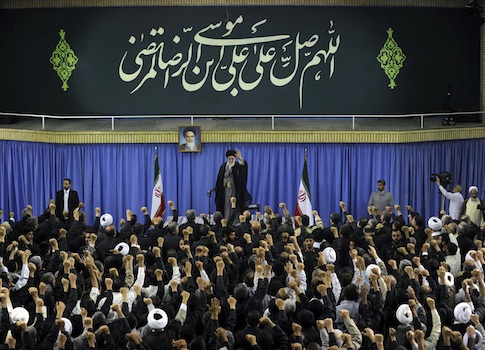Iran continued to sponsor terrorist activity around the world in 2013, according to a new State Department report on terrorism released Wednesday.
Iran was designated as a state-sponsor of terrorism in 1984 and has continued to sponsor terrorism in Gaza, African, Yemen, Bahrain, and Syria.
The report cited numerous instances of Iran providing financial support and arms to multiple terrorist groups, including Hezbollah.
The Islamic Republic has also provided training and military support to Shia Iraqi fighters who joined Syrian President Bashar al-Assad's forces.
According to the report:
Iran views Syria as a crucial causeway in its weapons supply route to Hizballah, its primary beneficiary. In 2013, Iran continued to provide arms, financing, training, and the facilitation of Iraqi Shia fighters to the Asad regime’s brutal crackdown, a crackdown that has resulted in the death of more than 100,000 civilians in Syria. Iran has publicly admitted sending members of the IRGC to Syria in an advisory role. There are reports indicating some of these troops are IRGC-QF members and that they have taken part in direct combat operations. In February, senior IRGC-QF commander Brigadier General Hassan Shateri was killed in or near Zabadani, Syria. This was the first publicly announced death of a senior Iranian military official in Syria. In November, IRGC-QF commander Mohammad Jamalizadeh Paghaleh was also killed in Aleppo, Syria. Subsequent Iranian media reports stated that Paghaleh was volunteering in Syria to defend the Sayyida Zainab mosque, which is located in Damascus. The location of Paghaleh’s death, over 200 miles away from the mosque he was reported to be protecting, demonstrated Iran’s intent to mask the operations of IRGC-QF forces in Syria. [...]
Despite its pledge to support Iraq’s stabilization, Iran trained, funded, and provided guidance to Iraqi Shia militant groups. The IRGC-QF, in concert with Hizballah, provided training outside of Iraq as well as advisors inside Iraq for Shia militants in the construction and use of sophisticated improvised explosive device technology and other advanced weaponry. Similar to Hizballah fighters, many of these trained Shia militants then use these skills to fight for the Asad regime in Syria, often at the behest of Iran.
